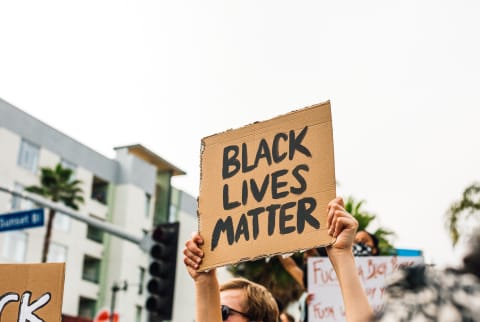Advertisement
How Non-Black People Can Stop The Fear Of Saying The “Wrong Thing,” From A Mental Health Expert


There's no question we're in the middle of a pivotal moment in United States history, as millions of people rally together in support of the black community and against police brutality. But for some nonblack folks, the fear of saying the wrong thing has become a reason to hold back.
Now is the time to put those fears aside. Now is the time to know these issues go far, far beyond individual discomfort. Saying the wrong thing in solidarity is still better than saying nothing at all, and black people are dealing with far worse.
We spoke with Erin M. Moss, LMHC, to break down how to overcome any fear and discomfort in order to start taking action.
Don't lose sight of perspective.
Moss explains that acting in empathy and solidarity should be the biggest priority for nonblack people right now.
"I bet it can provoke a lot of anxiety, but I would encourage a nonblack person to think about how they would feel if this was them, their child, or their family member," she says. "To sit and watch someone suffer, regardless of their race, is not acceptable. That will give you the motivation to support anyone."
For black people everywhere, seeing the pictures, the videos, the news, and social media—on top of the historical trauma the black community faces1—is exhausting and deeply painful from a mental health perspective, Moss notes. "Even if you don't fully understand that, it's time to validate those in pain, because that's just what you do when someone is hurting."
It is a privilege not to feel these pains directly, and to even have a choice of whether to address these injustices. And therefore it is only right to speak against them, even if you've been conditioned to think addressing race is awkward, distasteful, or unnecessary. It's not—and we need these conversations to happen for change to become a reality.
As Mikki Kendall writes in Hood Feminism, "Politeness as filtered through fragility and supremacy isn't about manners; it's about a methodology of controlling the conversation." So forget about prioritizing politeness, and instead, prioritize justice and the hard conversations. If something makes you uncomfortable, it's probably a sign it needs to be addressed.
You will probably get it wrong at least once—and that's OK.
As more and more voices join the conversation, know there's a chance you could miss the mark and potentially get called out for it. Do not let this stop you from continuing to learn and advocate. Being a good ally is an ever-evolving role that takes a willingness to keep educating yourself.
"We have to start somewhere," Moss says, adding, "I truly believe for a number of people, this may be the first time their eyes are opening. Maybe at the time, the #blackouttuesday square is all they had put up, for example, because they're still learning. We have to realize it takes time to get to where we want to be."
"Even one thing that shows support is pretty powerful rather than staying silent," she adds. And if you do get called out for potentially saying the wrong thing—take it in stride, and remember the previous points about maintaining perspective. Getting it wrong may feel discouraging, but this movement is much, much bigger than that.
If you still feel like you may not know enough, you can always focus on educating yourself while you amplify black voices within the movement. Once you feel you can speak confidently, do so—but continue reposting and sharing content from black voices and black educators.
Using your voice doesn't stop once you're offline.
Moss reminds us and emphasizes the biggest conversations need to start at home. "We have so much reach today with the internet," she says, "but we have to also make sure we're breaking down those learned behaviors."
"Kids are taught to work with their environment, so look at the messages you're putting out in your own home," she says. "That's where it starts—at the dinner table. And if you can get your dad to look at something even just a bit differently today, maybe next week he researches it and comes back and you talk about it again. That is so powerful."
It is both impactful and important to show your support publicly, but it is equally, if not more, important to go beyond talking the talk. Remember to listen to the concerns of black people, first and foremost, Moss says. And when you've made it known that you stand with the black community, remember to also stay up to date on existing racial disparities2, support black-owned brands and businesses, and be actively anti-racist in every way you can.